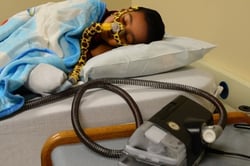Continuous Positive Airway Pressure (CPAP)
Jump to:
What is CPAP?
CPAP is a treatment that helps your child breathe better and prevents snoring. It is a small machine that connects to a mask. The mask fits over your child’s nose or nose and mouth while they are sleeping. The machine gently pushes air through the mask and into your child’s airway, keeping it open. The CPAP machine does not give oxygen. If it is needed, an order can be written. What is Obstructive Sleep Apnea (OSA)?
OSA happens when the airway becomes blocked during sleep. This happens many times during the night. When left untreated, OSA can cause growth, learning, or behavior problems. It can even cause heart problems. Treatment can help prevent these problems, make them less severe, or make them go away.Why does my child need CPAP?
Your child’s sleep study shows they have Obstructive Sleep Apnea (OSA). They may need to have their tonsils or adenoids taken out. If your child has already had this surgery or they are not able to have the surgery, then CPAP may be suggested by your doctor.Using CPAP
A home equipment company will show you how to use and clean the CPAP equipment. CPAP works best when it is used all night, every night. This may not be easy at first, but with regular use most children and teens get used to wearing it. The CPAP machine has a modem that uploads data to an online program. After starting CPAP, a Respiratory Therapist from our sleep program will look at the data. Then they will contact you to talk about how your child is doing with wearing CPAP. We may be able to solve simple problems over the phone.Your child will also need to have a clinic visit about 1 to 2 months after starting CPAP. During that visit, the CPAP machine and mask will be checked. You will get help with any problems your child might have using CPAP. Your child should keep using CPAP unless the doctor or nurse practitioner tells you it is safe to stop.
Ask staff about these other teaching sheets that may be helpful
#1451 Helping your child wear a CPAP mask
#1281 BiPAP



